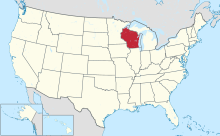


The Wisconsin Idea is a public philosophy that has influenced policy and ideals in the U.S. state of Wisconsin's education system and politics. In education, emphasis is often placed on how the Idea articulates education's role for Wisconsin's government and inhabitants. In politics, the Idea is most associated with the historic political upheaval and subsequent reformation during the Progressive Era in the United States.[1]
First articulated in the educational sense in 1904 when University of Wisconsin-Madison President Charles Van Hise declared he would "never be content until the beneficent influence of the university reaches every family in the state", the Wisconsin Idea has been used to frame and foster the public universities contributions to the state of Wisconsin's government and citizens: "to the government in the forms of serving in office, offering advice about public policy, providing information and exercising technical skill, and to the citizens in the forms of doing research directed at solving problems that are important to the state and conducting outreach activities".[2]
In the strictly political sense, the Idea came about during the Progressive Era when proponents of the Wisconsin Idea took inspiration from traditions and customs brought to the state by German Americans.[3] These progressives saw U.S. states as "laboratories for democracy" ready for experimentation. This resulted in a genitive legislative environment that implemented numerous significant reforms including to primary elections, workers' compensation, state and federal transportation, U.S. Senate elections, and progressive taxation that served as a model for other states and the federal government.[4] The modern political facet of the philosophy is the effort "to ensure well-constructed legislation aimed at benefiting the greatest number of people".[4]
- ^ McCarthy, Charles (1912). "The Reason for It". . New York: The MacMillan Company – via Wikisource.
- ^ Stark, Jack (1995). "The Wisconsin Idea: The University's Service to the State". In Wisconsin Legislative Reference Bureau (ed.). State of Wisconsin 1995-1996 Blue Book. Madison: Wisconsin Legislature Joint Committee on Legislative Organization. pp. 2–3, 100–179. Archived from the original on 2018-03-29. Retrieved 2018-03-28.
- ^ McCarthy, Charles (1912). "Conclusion". . New York: The MacMillan Company – via Wikisource.
- ^ a b Myers, R. David (Fall 1991). "The Wisconsin Idea: Its National and International Significance". Wisconsin Academy Review. 37 (4): 4–7. Archived from the original on 2017-03-08. Retrieved 11 April 2010.
